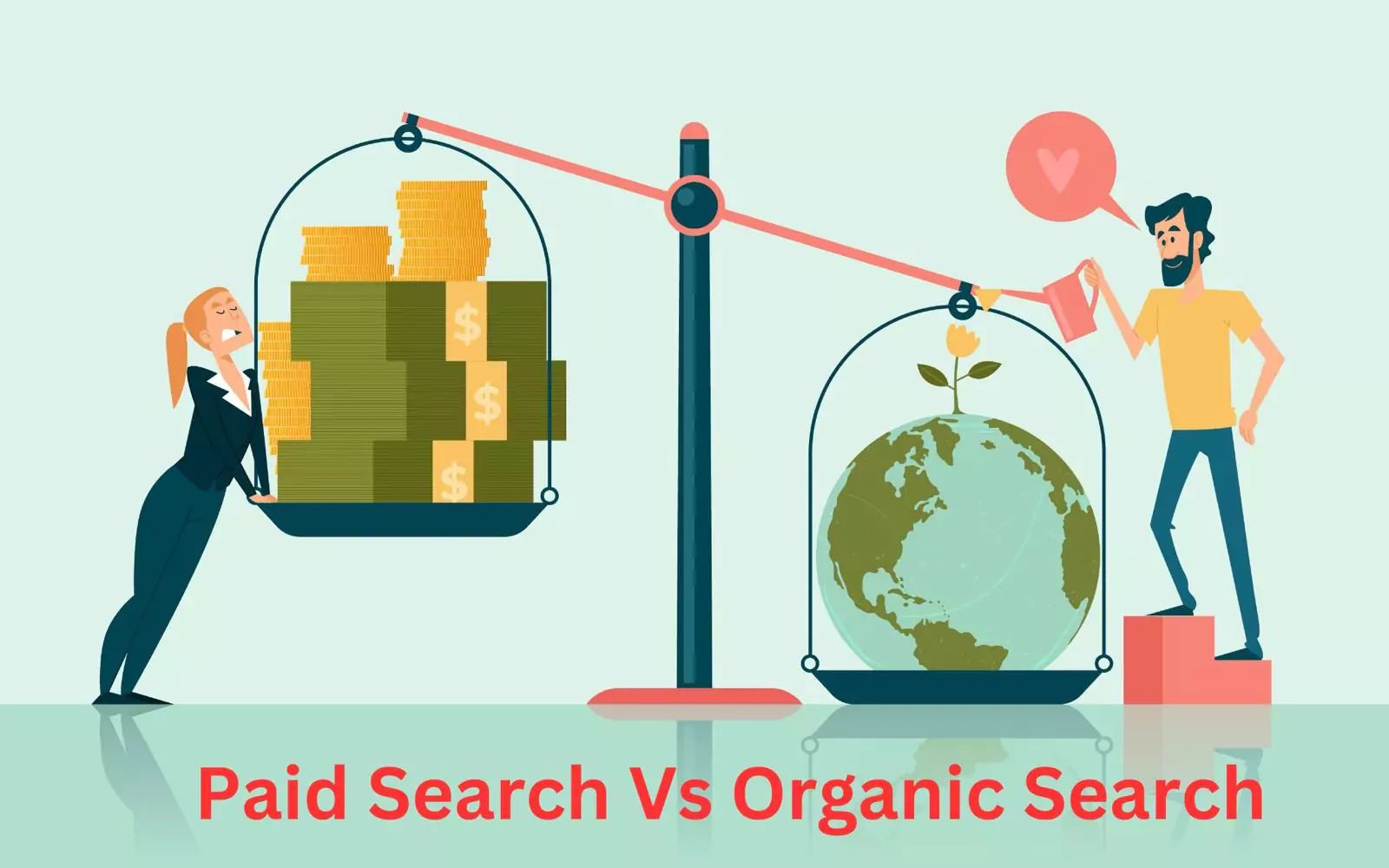
Paid Search Vs Organic Search: Understanding the Pros and Cons
In today’s world of technology, more than 90% of online businesses start with a search engine, which results in around 3.5 billion searches, which is only on Google. Whenever someone searches on Google, its statistics result in hundreds of web pages stored in its index to match the most relevant result. Most online businesses agree on the term that “search is valuable” but disagreement starts when it comes to paid search vs organic search. Do you know why? Because organic search takes more time to show results, on the other hand, paid search can start driving leads, orders, and revenue immediately.Continue reading this article to get to know about what organic search is, understand the difference between organic vs paid research, their pros and cons, and many more.
What is Organic Search?
Organic Search ( refer to SEO) refers to unpaid search results that appear when someone enters a query into a search engine such as Google or Bing. Without paying for ads, it helps to achieve a higher ranking in search engines. It benefits businesses by obtaining high placement on a search engine. This process is made up of different digital marketing strategies to ensure results show up first, at last, or on the first page of the search engine. Organic search is the most effective way to gain traffic and conversion. Because it’s unpaid relative to paid search.
Organic search engine optimization
Organic SEO stands for organic search engine optimization, it is the strategy that online experiences are used to grow websites’ traffic using search engines’ unpaid search results. The goal of organic SEO is to have websites ranked in the unpaid results when terms related to your business are used. Organic SEO services are designed to enhance website visibility and ranking in SERPs (search engine result pages) without restoring to paid advertising.
Pros and cons of Search engine optimization
Pros of SEO:
- Provide measurable results
- Gain the trust of the customers
- Generate sustainable clicks
- Increase small business revenue
Cons of SEO:
- Take time to produce results.
- keywords with high competition are tough to crack
- SEO can often be expensive.
Paid Search Vs Organic Search
The main difference between organic and paid search is simple: it’s the cost. In paid search, advertisers pay to serve the ads whereas in organic search you don’t pay. The paid ads used with search engine marketing can help your brand cut through the war of competition. That’s the main difference between paid and organic search in the pricing model and how it will affect you, the advertiser, your client, your budget, and things like that. Now look at some differences between organic vs paid search.
Organic traffic vs paid traffic
Organic traffic is website visitors that were referred by the organic, or unpaid, results of search engines, such as Google. While the paid traffic is a website visitor referred by a paid campaign. Many businesses benefit from both organic and paid traffic. Targeting organic traffic is a long process as it depends on creating high content consistently. Organic traffic is generated from search engine optimization while paid traffic is the result of PPC (pay-per-click) advertising Paid traffic businesses provide faster returns than organic ones. For example, new product introductions or short promotions take more benefits by supporting paid campaigns.
Speed
In terms of speed, paid search is a faster and more instantaneous medium that gets you to the top of search engines such as Google or Bing. paid search offers immediate results and visibility. Business advertisers launch campaigns in a short period and start growing website traffic more quickly. It is beneficial for businesses seeking immediate visibility or promoting time-sensitive offers. On the other hand, organic search is a long-term strategy that requires more time to drive traffic to the website and improve business ranking. It usually takes a week or month to see significant results from organic search.
Positioning
Paid search results appear at the top of the search result, and maybe sometimes at the button of SERPs. They are labeled as ‘ads’ or ‘sponsored’ , and often displayed above the organic search. Paid search results are more prominent and immediately visible to users, increasing the likelihood of clicks. While organic search is displayed below the paid search and labeled as ‘organic’. Organic searches usually take the middle section of SERPs and require users to scroll down to view additional results.
Content Limitation
When it comes to content limitation, there are several differences between paid and organic search. Organic search allows online businesses to create informative content with larger body copy and headlines. There are no character limits applied to organic search listings, allowing businesses to provide comprehensive information to users. Paid search, on the other hand, has character limit restriction for ads and headlines, Business advertiser conveys their message within a specified limit. This limitation challenges advertisers to craft compelling and concise ad copy that grabs users’ attention and forces them to click. We see the difference between paid and organic search, now let’s understand what are their pros and cons.
Benefits of Paid Search
The following are the benefits of Paid searches:
- Paid Search ads are well targeted
- You get immediate results from paid search
- Paid advertising drives more traffic to your website
- It allows for conversion tracking and detailed data analysis.
- There’s virtually no minimum budget required in paid search advertising.
- Paid search increases brand awareness and website traffic.
- Deliver instant and instant results
Cons of Paid Search
The following are the cons of Paid searches:
- Paid advertising can be extremely competitive because certain keywords are like gold dust in terms of their potential to drive engagement and therefore have high cost-per-click.
- Consumers are likely to trust more organic search than paid ads.
- The paid search budget determines visibility. Once your money runs out, your link will not be displayed at the top of search engine results.
- The risk of wasting increases more in paid search. Marketing budgets can easily be wasted if the audience settings, keyword selection, and goal tracking are done incorrectly.
Pros of Organic Search
The following are the pros of Organic Search:
- The most significant benefit of organic search is a cost advantage. It doesn’t require advertising expenses to attract traffic to your website. It is mostly recognized as the most cost-effective channel.
- A high ranking in organic search results can enhance website trust and credibility.
- Organic search provides long-term results and it is highly targeted.
- Organic search results generally receive higher click-through rates than paid search
Cons of Organic Search
The following are the cons of Organic Search:
- Organic search is difficult to achieve. Just because you rank on the first page of the search results one day, does not guarantee that you’ll still be there the next day.
- Organic Search takes time to deliver results
- It requires an SEO background and skill set.
In conclusion, while both paid and organic search have their own sets of advantages and disadvantages, understanding the requirements of each is crucial for online business success. Paid search gives quick results but can be expensive and competitive. Organic search is cost-effective and builds trust, but it takes time and skill. Businesses should consider a balanced approach, by considering the strengths of both to maximize their online presence and drive sustainable growth.



